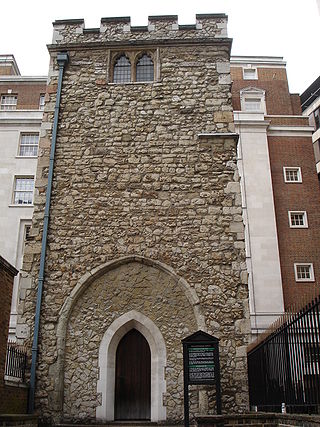
All Hallows Staining was a Church of England church located at the junction of Mark Lane and Dunster Court in the north-eastern corner of Langbourn ward in the City of London, England, close to Fenchurch Street railway station. All that remains of the church is the tower, built around AD 1320 as part of the second church on the site. Use of the grounds around the church is the subject of the Allhallows Staining Church Act 2010.

Kew Railway Bridge spans the River Thames in London, England, between Kew and Strand-on-the-Green, Chiswick. The bridge was opened in 1869.

Frognal is a small area of Hampstead, North West London in the London Borough of Camden. Frognal is reinforced as the name of a minor road, which goes uphill from Finchley Road and at its upper end is in the west of Hampstead village.

The Ossulston Estate is a multi-storey council estate built by the London County Council on Chalton Street in Somers Town between 1927 and 1931. It was unusual at the time both in its inner-city location and in its modernist design, and all the original parts of the estate are now Grade II listed buildings.

The Old Pack Horse is a Grade II listed public house in a prominent position on the corner of Chiswick High Road and Acton Lane in Chiswick, London.
Arthur Edward Sewell (1872–1946) was an English architect, particularly known for the public houses he designed whilst working as the in-house architect for Truman's Brewery. His career peaked in the 1920s and 1930s, and at least five pubs that he designed in that period are now listed buildings with Historic England. In all, he designed around 50 pubs.

The Castle is a Grade II listed public house at 34-35 Cowcross Street, Farringdon, London.

The Church of St Mary and St Thomas is one of two Anglican churches in Knebworth, Hertfordshire, England. The church dates from the twelfth century and is a grade I listed building.
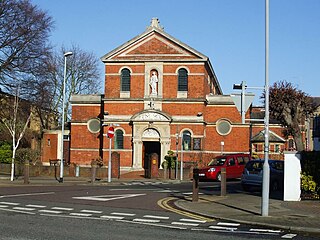
St Agatha's is a Roman Catholic church on Wyndham Road in Kingston upon Thames, London. It is dedicated to Saint Agatha of Sicily.

The Croft is a large detached house on Totteridge Green in Totteridge, Barnet. It has been Grade II listed on the National Heritage List for England since November 1974.
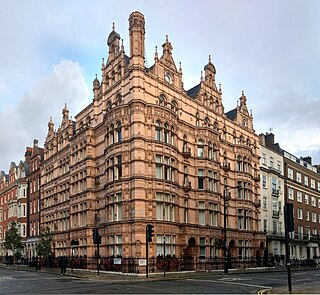
Wimpole House at 28–29a Wimpole Street is a group of Grade II listed town houses on the corner of Wimpole Street and New Cavendish Street in the City of Westminster, London.
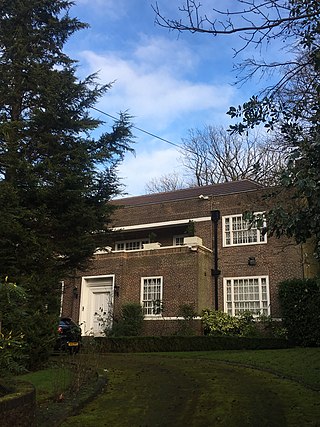
Spaniards Mount at 61 Winnington Road in Hampstead Garden Suburb, London is a detached house that was designed by the architect Adrian Gilbert Scott as his personal residence. It was built in 1935 and has been Grade II listed on the National Heritage List for England since November 1996.
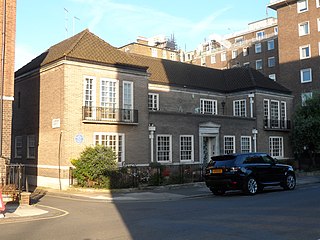
Chester House on Clarendon Place in Paddington, London is a detached house that was designed by the architect Giles Gilbert Scott as his personal residence. Gilbert Scott lived in the house from its completion in 1926 until his death in 1960. It has been Grade II listed on the National Heritage List for England since April 1975. The Historic England heritage listing for Chester House notes the "Restrained carefully proportioned stripped Renaissance design". The house was the recipient of the annual medal for London street architecture of the Royal Institute of British Architects in 1928.

Tappen House on Dulwich Common Road, in Dulwich in Southwark, south east London, is a detached house that was designed by George Tappen,the surveyor of Dulwich College. It has been Grade II listed on the National Heritage List for England since September 1972.
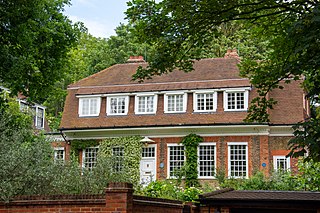
One Oak at 16 Redington Road in the Frognal area of Hampstead, London NW3, is a detached house built in 1889 by the architect Arthur Heygate Mackmurdo. The house has been listed Grade II on the National Heritage List for England since January 1999.

The Logs at 17–20 Well Road and 1, 2 and 3 Cannon Lane is a large house in Hampstead, in the London Borough of Camden, NW3. The Logs has been listed Grade II on the National Heritage List for England since May 1974.

Church Row is a residential street in Hampstead in the London Borough of Camden. Many of the properties are listed on the National Heritage List for England. The street runs from Frognal in the west to Heath Street in the east. St John-at-Hampstead and its additional burial ground is at the west end of the street.

Moreton House is a detached house on Holly Walk in Hampstead in the London Borough of Camden. It has been listed Grade II on the National Heritage List for England (NHLE) since December 1969.

The Duke of Sussex, Acton Green is a public house, opened in 1898, in the northern Chiswick district of Acton Green. It is prominently situated on a corner facing the common. The Grade II listed building is "elaborately decorated" to a design by the pub architects Shoebridge & Rising.

The Cathedral of the Nativity of Our Lord is a Georgian Orthodox church located on the border of Upper Clapton and Stamford Hill, London. Since its opening in 1892 as the Agapemonite Church of the Ark of the Covenant it has served as the sole London outpost of three very different Christian denominations. During the second half of the twentieth century it was the Church of the Good Shepherd and belonged to the Ancient Catholic Church, a now defunct denomination. In 2011 it became a Georgian Orthodox Cathedral and gained its current name. It is a Grade II* listed building, in part because of its exceptional Arts and Crafts stained glass windows but also as the former headquarters of a late-Victorian Christian cult.



















